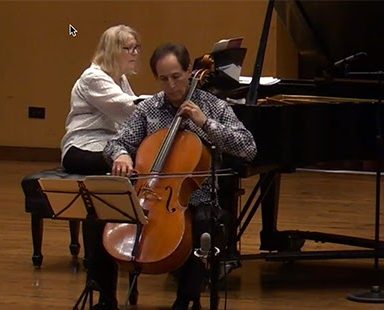By Daniel Hathaway
. Weiss & Jones give CIM faculty recital
. Akron Symphony to celebrate 70th season
. Almanac: a “slightly evil” take on the demise of Jean-Baptiste Lully
HAPPENING TODAY:
7:30 pm – CIM Faculty Recital: Richard Weiss, cello, Joela Jones, piano and accordion (pictured). De Falla’s Suite Popular Española, Errollyn Wallen’s Dervish (2001), Matyas Seiber’s Introduction & Allegro & Debussy’s Two Arabesques (arr. Choisnel/Roques), La Plus Que Lente Valse (arr. Kocsis) & Cello Sonata in d. Mixon Hall, 11021 East Blvd, Cleveland. Free, but a reservation is required.
IN THE NEWS:
The Akron Symphony Orchestra will open its 2023-2024 concert season with Beethoven’s Ninth Symphony on September 29. The program will celebrate the 50th anniversary of EJ Thomas Hall. “We are thrilled to be a part of EJ Thomas Hall’s 50th anniversary celebrations and honored to have the opportunity to open the Akron Symphony Orchestra’s 70th season at this historic venue.
“As the orchestra that performed at the hall’s inaugural night on October 9, 1973, we are privileged to still be performing here 50 years later,” said Paul Jarrett, Executive Director. “It is fitting that we open the season with Beethoven’s Ninth Symphony, a work that we performed at the opening of the hall, and, like EJ Thomas Hall, has stood the test of time.”
Download the press release here.
ALMANAC FOR MARCH 22: A PECULIAR PASSING
By Jarrett Hoffman
Two little quirks of writing tributes to famous musicians for our almanac: summoning the appropriate language for the occasion, and finding synonyms to avoid repetition.
There is a convenient term for the anniversary of someone’s “entrance to this world,” shall we say — a birthday. And it’s easy to conjure an appropriate atmosphere for those: we celebrate them, as we do today for musical theater composers Stephen Sondheim and Andrew Lloyd Weber (born in 1930 and 1948, respectively), Leeds International Piano Competition co-founder and longtime artistic director Fanny Waterman (who originated in 1920), humorous illustrator and musician Gerard Hoffnung (sprang into existence in 1925), and Pulitzer Prize-winning composer Joseph Schwantner (issued forth in 1943).
What’s the opposite of a birthday? Technically, deathday, but if you use that word, then you are most likely a murderer. Less creepy, but more wordy: anniversary of someone’s passing.
When it comes to setting the mood on such an occasion, you’re probably aware that celebrate is not the appropriate verb to use. What about mark — as in we mark someone’s death? A bit cold. Mourn? Overdoing it, especially when the figure in question passed away long ago. Perhaps honor is best — it carries a certain distance as well as respect.
And yet, honoring is not exactly what we’ll be doing today. Instead, we’ll indulge in some slightly evil fun as we revisit the demise of that Italian-born master of the French Baroque, Jean-Baptiste Lully, who perished on this date in 1687 in Paris at the age of 54. Surely by now the ghost of Lully can laugh just a little bit at his own departure, which has been described as one of the most ridiculous, or at least most peculiar, in history.
First, a bit of background: before batons, a conductor would keep time for an ensemble by tapping a roll of paper against something, or sometimes beating a lengthy staff into the ground.
Unfortunately, it was the latter method that Lully — Master of the King’s Music under Louis XIV — used in 1687 when leading his own Te Deum to celebrate the king’s recovery from a recent illness. Lully mistakenly struck his own foot, the wound became gangrenous, and as a dancer, he refused amputation. He died two months later.
The incident is captured in a dramatic scene (screenshot up top) from the 2000 movie Le Roi danse. Thanks to the internet, you can zero in on that one clip, whose title on YouTube can only be described as pure poetry: “Jean-Baptiste Lully stabs himself in his foot and dies.”
On an exclusively musical note, watch a performance of the Te Deum by William Christie and Les Arts Florissants here — the unnamed soloists are fantastic, as are the double chorus and orchestra.
And finally, an idea for a particular brand of historical performance. Will some ensemble out there embrace theater to “recreate” that ill-fated 1687 Te Deum? No harm done to any conductor, of course — no one would ever wish for that. The music wouldn’t even have to suffer: it could continue while the conductor — doubling as a good actor — limps offstage. And in this case, for the sake of the concert, why not brighten up history? The conductor could return fully healed in just a moment, do a short dance in honor of Lully, and then climb back onto the podium and finish things out, back from the dead, to uproarious applause.



